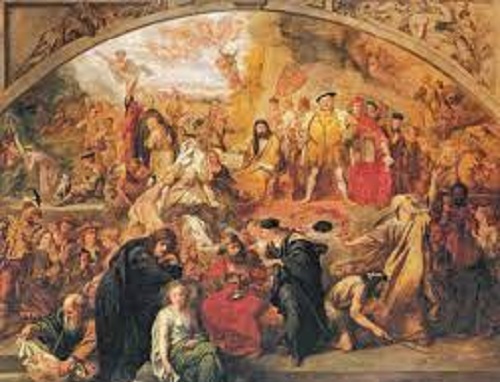

Men and women during the age of Chaucer
The Age of Chaucer covers the period from 1340 to 1400. He was born in the reign of Edward III, lived through that of Richard II, and died the year after Henry IV ascended the throne. His life thus covers a period of glaring social contrasts and political change.
The principal events, trends, and movements of this age-the age of Chaucer- in the political, economic, social, religious, and literary spheres are important for a proper understanding of the background of Chaucer’s life and work. Every man is a child of his age. He is influenced by it, though, if he is a great man, he may influence it also. A great writer like Shakespeare or Chaucer is generally said to be “not of an age, but of all ages.”
But in spite of his universal appeal, the fact remains that even he could not have escaped “the spirit of the age”, in which he lived and moved and had his being. Emphasizing this point, W. H. Hudson says, “every man belongs to his race and age; no matter how marked his personality, the spirit of his race and age finds expression through him.”
Chaucer is the greatest English comic poet, and also a great serious poet. His life was one of extraordinary richness and variety, centered in the most brilliant court of the Europe of his day. His activities as courtier, soldier, scholar, civil servant and writer reveal the remarkable diversity of culture attainable in the late Middle Ages. Robert Dudley French observes, “it was an age of restlessness, amid the ferment of new life, that Chaucer lived and wrote. Old things and new things appear side by side upon his pages. And in his poetry, we can study the essential spirit, both of the age that was passing and of the age that was to come.”
Chaucer’s age was an age of transition and unrest. Transition implies a shift from medieval to modern time, from religion to secularism, the emergence of the English nation from Dark Ages to the Age of enlightenment. Broadly speaking, the process of transition dates back to the second half of the 14th century. For the first time, man became dissatisfied with medieval ideas and practices. In fact, the Age of Chaucer was not stagnant; it was inching its way steadily and surely to the dawn of Renaissance and the Reformation, which were yet a couple of centuries ahead.
We cannot disagree with Kitteridge who calls the Age of Chaucer “a singularly modern time” because:
However, with William Ockham (see Occam’s razor), the long succession of famous schoolmen came to an end.
Read More
Of Truth Critical Analysis by Sir Francis Bacon
Of Truth by Francis Bacon Summary
Visit Us on our Facebook Page:
Comprehensive Summary of The God of Small Things Arundhati Roy’s The God of Small Things…
The Climax and Tragic Ending in Hamlet This article explores the topic The Climax and…
Claudius as a Villain in Hamlet Claudius as a villain, the antagonist of Shakespeare’s Hamlet,…
Hamlet’s soliloquies Shakespeare’s Hamlet is renowned for its exploration of the human mind, and nowhere…
Women in Hamlet: Ophelia & Gertrude Shakespeare presents two significant women in Hamlet, Gertrude and…
Intro to The God of Small Things Arundhati Roy’s The God of Small Things (1997)…
This website uses cookies.